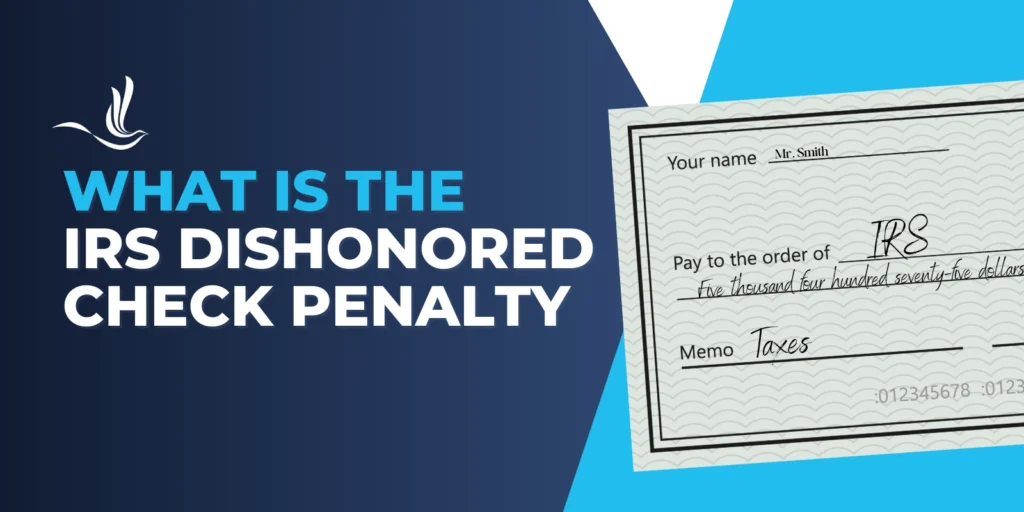What is the IRS Dishonored Check Penalty?

Dealing with the IRS can be an unnerving task for many taxpayers, especially when unexpected penalties arise. One such penalty that often catches people off guard is the dishonored check penalty. Understanding this penalty and how to avoid it is crucial for taxpayers to navigate their financial obligations smoothly. In this article, we explore the details of the IRS dishonored check penalty, its implications, and proactive measures taxpayers can take to prevent it.
What is the IRS Dishonored Check Penalty?
The IRS dishonored check penalty, also known as the bounced check penalty, is imposed when a taxpayer’s payment to the IRS is made with a check, and the check is returned unpaid by the bank due to insufficient funds or other reasons. When this happens, the IRS will typically send Letter 608C, Dishonored Check Penalty Explained. This penalty is separate from any penalties or interest that may apply to the underlying tax debt. It’s also important to note that the IRS will not attempt to resubmit a check. That said, the payment will be considered unpaid.
Implications of the Penalty
When a check is dishonored by the bank, the IRS imposes a penalty. The penalty is 2% of the check amount if it exceeds $1,250. If the check amount was less than $1,250, the penalty is the lesser of the following:
- $25
- The check amount
Additionally, interest may accrue on the unpaid tax amount from the original due date of the tax return until the date of payment. Furthermore, repeated instances of dishonored checks can result in increased scrutiny from the IRS. It may also lead to additional penalties or enforcement actions. Therefore, it’s essential for taxpayers to address any issues promptly to avoid further complications.
Preventive Measures
To avoid the IRS dishonored check penalty, taxpayers can take several proactive measures:
- Ensure Sufficient Funds. Before writing a check, verify that sufficient funds are available in the designated account to cover the payment amount.
- Double-Check Information. Accurate information, including the payee name, amount, and date, should be provided on the check to minimize the risk of errors that could lead to a dishonored check.
- Consider Alternative Payment Methods. Instead of using personal checks, taxpayers can opt for electronic payment methods. These include direct debit, credit card payments, or the IRS’s Electronic Federal Tax Payment System (EFTPS). These methods offer faster processing and reduce the likelihood of payment issues.
- Set Up Payment Plans. If paying the full tax amount upfront is not feasible, taxpayers can explore setting up an installment agreement with the IRS. This allows them to make monthly payments until the tax debt is fully paid, reducing the risk of bounced checks.
- Monitor Accounts: Regularly monitor bank accounts to ensure that payments to the IRS and other creditors are processed successfully. Promptly address any payment discrepancies or issues that arise.
Penalty Abatement
If you had expected the payment to clear, you can request penalty abatement from the IRS. You’ll need to submit a written explanation or proof that there was no reason to believe the check would not clear. It’s best to wait until after you receive Letter 608C to submit this.
Tax Help for Those Who Receive IRS Letter 608C
The IRS dishonored check penalty can result in additional financial burdens for taxpayers already facing tax obligations. By understanding the implications of this penalty and taking proactive measures to prevent it, taxpayers can avoid unnecessary fees and complications in their dealings with the IRS. Ensuring accurate payment information, maintaining sufficient funds, and exploring alternative payment methods are crucial steps in mitigating the risk of bounced checks and related penalties. By staying vigilant and addressing payment issues promptly, taxpayers can navigate their tax obligations more effectively and minimize the impact of penalties on their financial well-being. Optima Tax Relief is the nation’s leading tax resolution firm with over a decade of experience helping taxpayers with tough tax situations.
If You Need Tax Help, Contact Us Today for a Free Consultation